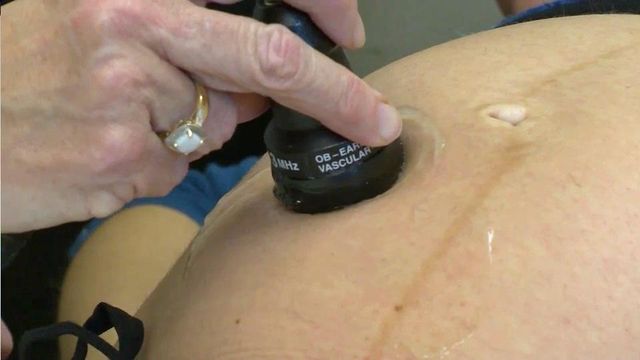New guidelines recommend depression screening for expecting, new moms
As many as 10 to 15 percent of expectant and new moms suffer from postpartum depression and perinatal mood disorders.
Posted — UpdatedAs many as 10 to 15 percent of expectant and new moms suffer from postpartum depression and perinatal mood disorders.
At a time when many expect joy, they often feel helpless, hopeless and anxious. They might be exhausted or lack interest in the baby and feel disconnected.
Researchers have found that the effects can extend beyond moms. Family members and the newborn baby also experience setbacks when mood disorders remain untreated. The mother-infant relationship, family connections and infant development all are at risk.
Even though so many families experience the downs of postpartum depression and other mood disorders, not every pregnant woman or new mom is even screened to find whether they are suffering.
While new parents typically visit a pediatrician regularly to ensure the newborn is healthy, new moms often don't return to their own doctors until six weeks after birth. By then, for some moms, their lives have spiraled out of control.
For the first time, the task force singled out pregnant and postpartum women for depression screening to weed out those moms who are suffering and get them the help they need.
"It is a critical first step," said Dr. Samantha Meltzer-Brody, director of the perinatal psychiatry program at the UNC Center for Women's Mood Disorders.
The screening program at UNC has been a success, but many moms in the Triangle are never asked if they are hurting.
"If you deliver at some of the private practices in the Triangle, you will not be screened ever," Meltzer-Brody said. "Even now in 2016, it’s a hit or miss. All of this is so distressing."
Things won't change overnight, but Meltzer-Brody said the weight of the new recommendations in the healthcare community is "powerful" at a time when some still question whether the screening is effective.
"The perinatal psychiatry community has been wildly celebrating this," Meltzer-Brody said of the new recommendations. "It has been such an exciting time. We have felt there has been sufficient evidence for a while. It has been frustrating for the field not to have mandated screening or stronger recommendations for screening."
The next steps to actually implement the new recommendations across the country are many.
Providers will now need to shift their thinking on how women in the peripartum period are treated, said Dr. Michael Pignone, professor of medicine and chief of the division of general internal medicine at UNC and a member of the U.S. task force that created the guidelines. Once the baby is born, for instance, the focus shouldn't be entirely on the newborn.
"We have to think about better ways - innovative solutions," Pignone said. "It's not just about the birth process itself. It's about the preparation, the birth process and integrating a new baby and mother into a new home."
It also will be important for providers to not only screen patients, but also make sure they can access help when they need it, Pignone said.
"This will hopefully lead to systems having to sit down and adopt one of the many different tools and programs that are out there," she said. "There are many cool things that are being done across the country. It's just a matter of systems making it a priority."
"It can be detected and it can be effectively treated," Brody-Meltzer said. "This is really so hopeful."
If you or somebody you know is experiencing postpartum depression or other perinatal mood disorder, there is a lot of help out there and so many options for treatment. Please get help.
For more information and resources, check out:
- Postpartum Support International
- Postpartum Progress
- Center for Women's Mood Disorders at UNC-Chapel Hill
- Postpartum Education and Support, which is based in Raleigh and offers support groups and more
• Credits
Copyright 2024 by Capitol Broadcasting Company. All rights reserved. This material may not be published, broadcast, rewritten or redistributed.





